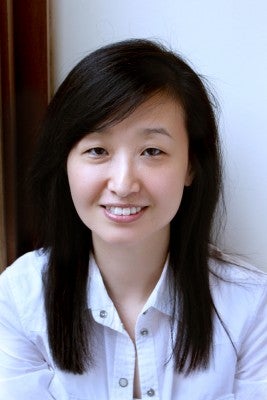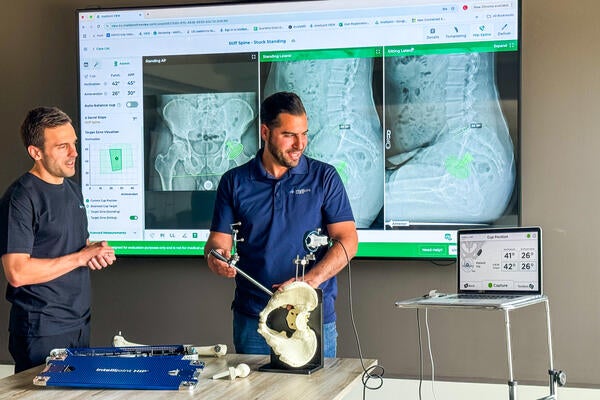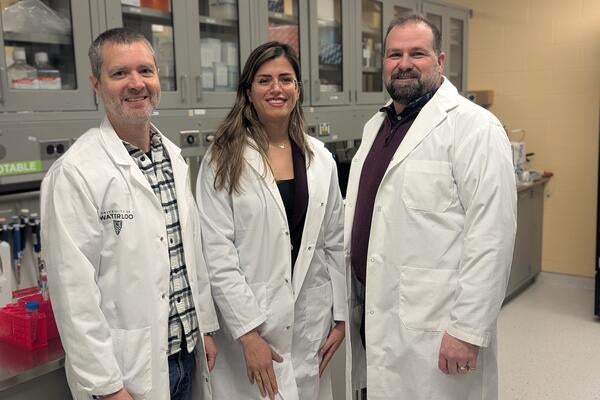
Unique engineering education leads to HR startup pymetrics
Develpoment of a career assessment and recruiting platform that injects science and technology into the field of HR

Develpoment of a career assessment and recruiting platform that injects science and technology into the field of HR
By Julie Stauffer Faculty of EngineeringShe has an awesome CV. He aced the interview. Both received glowing referrals. But will either succeed in your company? Employers have a lot riding on their hiring decisions. Picking the wrong candidate can cost an organization thousands of dollars in wasted time and lost productivity, not to mention damaging workplace morale.
In most cases, what separates rising stars from unsuitable staffers aren’t technical skills. Instead, it’s that often elusive quality called “fit.”

Waterloo Engineering graduate Julie Yoo is the chief scientific officer of pymetrics, an innovative career assessment and recruiting platform.
In 2012, Julie Yoo teamed up with a fellow Harvard post-doc to launch pymetrics, a career assessment and recruiting platform that injects science and technology into the field of HR.
How do you know whether the candidate across the table has it? Waterloo Engineering graduate Julie Yoo figured some engineering know-how and scientific insight might just yield an answer. And that’s exactly the combination she brought to the problem, having studied neuroscience during a joint Harvard/MIT PhD after completing an undergraduate degree in computer engineering and master’s degree in electrical engineering at Waterloo.
Unlike the battery of personality tests already on the market, pymetrics doesn’t use questionnaires. It’s difficult for candidates to judge themselves objectively, Yoo points out, and far too tempting to supply the “right” answer to get their dream job.
That’s why pymetrics relies on a dozen deceptively simple games, such as the classic “Go/No Go” test. If a red circle appears on screen, candidates press the space bar. If the circle is green, they do nothing. Just how quickly and accurately they respond says a lot about their personality.
Together, the neuroscience-based games paint a profile of job seekers’ cognitive and emotional traits, covering everything from their ability to avoid distraction to tolerance for risk-taking.
But that’s just half the picture. pymetrics also uses the same gamified testing on a company’s current employees to build profiles for each position. The software then identifies promising job candidates using the same kind of recommendation engine technology that drives OKCupid and Netflix suggestions.
In trials with MBA student placements, adding pymetrics recommendations to the hiring process boosted the conversion of interns to full-time hires from 75 per cent to 91 per cent.
Those stats have major companies sitting up and taking notice — companies that include Wall Street wealth management firms, executive recruiters, tech startups and more. Investors have funnelled $2.5 million in venture capital into pymetrics. Meanwhile, more than 100,000 career seekers have taken the online assessment.
Yoo, pymetrics chief scientific officer, attributes part of that success to her Waterloo Engineering education. She cites the resilience and multi-tasking skills she developed juggling co-op job searches with academics, as well as the real-world skills she learned during her work terms.
Above all, she believes Waterloo Engineering equipped her to handle challenge.
I didn’t just learn to be a computer engineer at Waterloo,” Yoo explains. “The undergrad curriculum taught me how to be an effective problem solver as well.”
No doubt she’ll continue to draw on those skills as pymetrics scales up. The New York City-based company is currently pursuing series A funding, expanding its 10-person staff and translating its platform into multiple languages.
“I feel like what we have been doing for the past two years is just barely the tip of the iceberg,” says Yoo. “I’m excited about the future opportunities for pymetrics.”

Read more
Two University of Waterloo affiliated health-tech companies secure major provincial investment to bring lifesaving innovations to market

Read more
Researchers engineer bacteria capable of consuming tumours from the inside out

Hand holding small pieces of cut colourful plastic bottles, which Waterloo researchers are now able to convert into high-value products using sunlight. (RecycleMan/Getty Images)
Read more
Sunlight-powered process converts plastic waste into a valuable chemical without added emissions
Read
Engineering stories
Visit
Waterloo Engineering home
Contact
Waterloo Engineering
The University of Waterloo acknowledges that much of our work takes place on the traditional territory of the Neutral, Anishinaabeg, and Haudenosaunee peoples. Our main campus is situated on the Haldimand Tract, the land granted to the Six Nations that includes six miles on each side of the Grand River. Our active work toward reconciliation takes place across our campuses through research, learning, teaching, and community building, and is co-ordinated within the Office of Indigenous Relations.